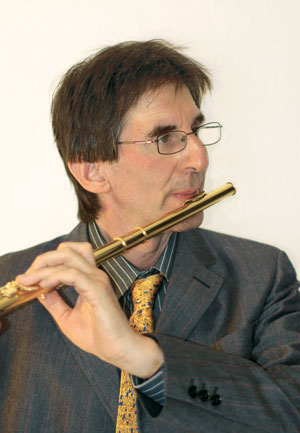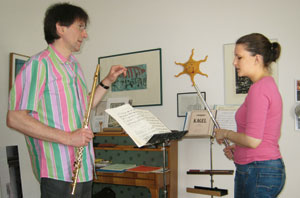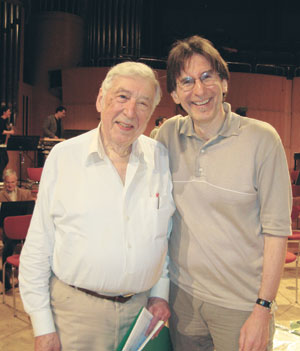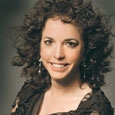 German flutist Michael Faust, or Michael Fist, as he translates his name into English, is principal flutist in the Sinfonieorchester des Westdeutschen Rundfunks (WDR Symphony Orchestra Cologne). He is as active a soloist as he is an orchestral musician and often performs works composed specifically for him, such as Mauricio Kagel’s Das Konzert.
German flutist Michael Faust, or Michael Fist, as he translates his name into English, is principal flutist in the Sinfonieorchester des Westdeutschen Rundfunks (WDR Symphony Orchestra Cologne). He is as active a soloist as he is an orchestral musician and often performs works composed specifically for him, such as Mauricio Kagel’s Das Konzert.
This year Faust was chosen as one of the flutists featured on the Gala Concerto Concert at the National Flute Association Convention in Anaheim, where he performed Peteris Vasks’ new flute concerto, which was written for and dedicated to him. His discography is large and growing and includes the recently released recording of the Vasks and Kagel concertos with Patrick Gallois conducting.
I had the opportunity to meet Faust in June while I was on tour in Köln, Germany, his home town. Our first of several encounters took place at a quaint corner pub in the Nippes neighborhood where Michael lives, a few train stations away from the famous Dom Cathedral.
Beginnings
“My father came back from the war in 1949; he had been a prisoner of war. He lost ten of his best years, from ages 19 to 29, to that war. His dream was always to be a conductor of a band for dance music. He played the piano pretty well actually, and always schlager, a type of popular dance music. He knew all of the tunes. When the war ended, there was no way he could be a musician. He was from Köln, and Köln had been destroyed, so he had nothing. He studied mechanical engineering to make a living. He then met my mother and had four children. I was the fourth. He said that he knew when he met her that he wanted to have four kids, and that they would all learn music. That was his dream.
“Every day when he came home from work he sat down at the piano and played his schlager songs. Although he was a big manager at a company, he loved music. All of us kids had to learn an instrument. We all started at four years old with recorder and guitar, and then at 8 or 9 we chose our own instrument. Because I was the youngest, I heard my brother and sisters playing and practicing, so I wanted to do that too. The oldest played violin, next played piano, then cello, and I chose the flute. My brother Georg is now principal cellist of the Berlin Philharmonic.
“I wanted to play a stringed instrument actually, but because my oldest sister already played violin, my father suggested a wind instrument. I wasn’t interested because I thought winds had no music. I was 8 years old and only knew about strings and piano.
“My father talked to some people, and they told him that flute was the only wind instrument for a boy my age because the others were too difficult. So I tried the flute, and after the first lesson my teacher said I should stay with it. After a week I could play all the scales. I remember it was so easy for me.”
Teachers
Faust’s first teacher was Achim Tornow, who currently plays in the Essen Philharmonic Orchestra and was a student when he taught Faust. He gave Faust two-hour lessons at Faust’s home. “For at least an hour and a half of the two-hour lesson we talked about drilling holes and such. I love the art of woodworking and was much more interested in drilling holes or other woodworking activities than fluting. He was very important to me because he was not only a flutist but also a conductor, which gave me a different view of music. After a year or two of lessons, he loaned me scores of the pieces I was studying.
“I particularly remember his approach to dynamics. He taught what they meant in the context of each historical period. He showed me how to start the dynamics. For example, if you are playing in an orchestra and suddenly have a solo that you want to play piano, you don’t start piano. Instead you enter in a way so that the listener notices. Then you can play piano and they will hear you.”
After three or four years Tornow suggested that Faust, who was about 13 at the time, continue his studies with Cacilie Lamerichs at the Rheinische Musikschule. “She taught me everything. She taught me sensuality and the sensitivity of sound. She opened my mind by talking with pictures and colors. She used a lot of analogies. I now do this with my students.”
After winning the German national competition Jugend Musiziert in 1977, Faust continued studying in Hamburg with the husband-wife team of Karlheinz and Gertrud Zöller. Karlheinz was principal in the Berlin Philharmonic under von Karajan and professor at the University of Hamburg; Gertrud had studied with Hans-Peter Schmitz.
Later Faust, like many of his European peers, studied with Aurèle Nicolet. “Nicolet was my biggest inspiration. I went to him after polishing my flute playing with Zöller. Although Nicolet came to Frieburg sometimes, I went to work with him in Basel once a month for a year or two. I took the night train from Hamburg to Basel, took lessons with him all day, and then returned on the train to Hamburg.
“Nicolet showed me, again, how to look at music in a global way, a structured way, an harmonic way. When he taught a Bach allemande, the first question he asked was, ‘Which Bach allemande do you know?’ and if you didn’t immediately start to play a Bach allemande from the violin or cello suites, he looked at you – ‘You don’t know them?!’ He would then take out the music and you had to play the Bach allemande from the cello suite – in bass clef.
“Nicolet showed me that freedom is everything – freedom in thinking, freedom in imagination. We have to know everything about music; we should know everything about the composer’s biography, about the harmony – everything. If not, then you can’t play the music. Just playing the notes is not enough. Nicolet felt very strongly about this. If you played a piece and you didn’t know the biography of the composer, he would beat on you.”
Getting on an Orchestral Path
In his late teens, Faust faced the decision of whether to pursue an art career instead of music. At 17 he wanted to study painting and drawing instead of music. “I’m most inspired by the works of Wassily Kandinsky or Pieter Mondrian, but my focus was impressionism. The painting teacher with whom I worked daily making lithographs, played the flute. He also made his own flutes and even invented a type of recorder with a bell shape on the end, like a clarinet. He made around 150 flutes, ranging in size from tiny to huge, out of a material using glues.
“He told me that my way was the flute and not to go into art. I thought I was pretty equal in my skills, but it was the flute in the end and I went for it. I no longer do art, but I miss it a lot. I just spent a few weeks with Patrick Gallois. He has started to paint, and I thought, ‘Wow, it’s wonderful for him to do it, and I want to do it, too!’”
With a clear choice now at hand, Faust at 19, while continuing to work with the Zöllers, auditioned in Rome for the Orchestra di Santa Cecilia. New to the orchestral scene, he stayed only a few months, realizing that he wanted to return to his studies. “When I went to Rome, my partner on the piano was Alexander Lonquich. We had won the Jugend Musiziert Competition together, and a few months later he won a Schubert competition in Italy and became quite famous. He still lives there. As a result of winning the competition, we were invited to perform in Italy, which is where I met the Swiss flautist Conrad Klemm. He quit the orchestra and asked me to take his place with them. I knew very little about playing in an orchestra and didn’t want to take the job. I hadn’t studied the excerpts and knew nothing.”
Faust returned to Hamburg and in his third year of college entered an orchestra as an extra player. He soon would become principal in the Hamburg Opera Orchestra. According to Faust, there was some pressure for him to refrain from having a solo career: “They didn’t like me because I studied too much solo repertoire, and they wanted a purely orchestral player.”
He later went to Berlin and studied at the academy of the Berlin Philharmonic, and then on to Stuttgart where he played in the opera orchestra for two years. A position in the Munich Philharmonic followed, and since 1988 he has played in the WDR Orchestra in Köln.
“I love this job because I can play both solo and orchestral repertoire. As flute players we only have one chance to play Brahms. If I weren’t in the orchestra I wouldn’t be able to play Brahms, or Mahler, and these are my loves. I played Brahms 4, ten times with the great Sergiu Celebidache, and it is heaven what he can do with the musicians. This week I will play Tristan – and there is no such music in the solo repertoire, so I have to play in the orchestra or be at the opera every day.
“There are two principals in our orchestra, so I can plan my schedule very far ahead. I can be free for two to five weeks in a row, but then I have to play two to five weeks in a row. It is very different from opera work. I love the free time of the job. I can play solos, chamber music, and teach as well.”
Teaching Philosophies
Since 1998 Faust has been teaching at the Musikhochschule in Dusseldorf, which offers the equivalent of a master’s degree in music. Prior to this position, he taught at the European Mozart Foundation in Prague and Warsaw. His students on average are between 18 and 28 years old. 
“I love my teaching job. For me teaching is learning. Very often I tell my students, ‘Do you actually know why I’m teaching? It’s not for money but because I want to learn.’ They don’t understand, but when I teach, I have to figure out what I’m doing. Sometimes I don’t know how exactly I’m doing it, so by explaining and showing it, I become conscious of what I’m doing.
“I love having responsibility. In public school I am responsible for my students doing well on their exams so they can have a good life. I am responsible for getting them into an orchestra or a music school – or wherever they want to go. For me, it’s actually not important what degree they have. What is important is that they can play the flute and be confident in what they are doing. I have to show them ways to express themselves – to open their mind.”
Faust finds that while many of his students may have the technique, they are most in need of finding their personal approach to music. He shies away from being explicit with interpretations and explaining technical matters in detail. Instead, he prefers to act as a guide to show them the path while they have their own discoveries.
“They should not enter a school if they are not musical. Of course we wouldn’t take them if they weren’t, but sometimes students don’t know that they are musical. They don’t understand what it means to be musical. I try to show them what they really want. Some teachers show what they want and the students have to do it. I try to open their minds to themselves. Students have to desire a certain way of making music; otherwise they won’t do it.
“If I say, ‘Do this,’ then it is easy to teach – they just follow, and it’s done. It is like a technical painting not an artistic painting. It takes a longer time for a student to understand what I want, but afterwards they understand on a deeper level. I make my students play by heart. I want them to know that every bit is important and really get into the music.
“For students who enter with a ‘full cup,’ I send them elsewhere.* They can either leave or trust me. I don’t want them to lose anything that they already learned – just take another cup and fill it. I never tell them that they learned incorrectly. If they don’t want to learn, then they are wrong for me, or for any teacher. If I’m only there for their curriculum for a name, then I’m not the teacher for them.”
*Full cup is a reference to an expression used especially in martial arts to indicate the presence of knowledge. If you keep a full cup then you are not open to receiving new information. Martial arts students are encouraged to empty their cup prior to starting with a new instructor.
Curriculum
Faust requires that all students learn the daily Moyse studies – technique and tone, as well as technical studies that he develops on the spot during their lessons. “Some of them are afraid of me when I start inventing. I come up with weird stuff, and they have to do it.” Repertoire consists of the standards, and Faust likes to have them learn at least three or four pieces per semester coming from different stylistic periods from Baroque to 20th century. In the first semester all his students learn Varese’s Density 21.5 and play with exact rhythm and dynamics. He says that students learn about musical structure from these two pages of music.
Articulation
Faust’s approach to articulation stems from a variety of influences. Nicolet gave him articulation exercises that Faust continues to use with his own students. “One of the daily studies focused on his approach to legato and tonguing, which is between French (between the lips) and German (behind the teeth/upper palate). It is pretty much in front but not between the lips – it’s at the lips. My tonguing nowadays is German, but I can do the French. I learned both.
“The word ‘tongue’ not only refers to our tongue but also to language. What I like to experiment with is different languages. Each era has a different tonguing technique. We have to learn the Quantz diri diri – or at least know that it existed. Nowadays the flutes themselves are different and need different tonguing styles. The diri diri on the modern flute doesn’t work in the same way as on the traverso. So I don’t use diri diri on the gold flute, but I have to be able to sound like I’m using it.”
Breathing and Sound Production
I had the opportunity to watch Faust teach several of his students in private lessons at his home. He worked to open their sounds giving them certain physical cues and verbal instructions. “Don’t call it pressure – ever. Call it stream. There are faster and slower streams, but the air is still streaming. A couple weeks ago I suggested to my students to play without air and think backwards, as if inhaling. They played and were able to go on eternally. You breath in, and you don’t need any air. It is very piano, of course. The idea is for the sound to go on and on. And if you think you don’t have any air, you have great support, and you don’t push. It’s the feeling of stretching.
“I tell my students to breathe into their hips. Normally you say, ‘Breathe down, breathe full, try to fill yourself, and be open, and then you say, ‘Try to breathe into your back.’ We all do that. I got tired of saying that. It’s important to breathe everywhere. So I don’t need to say, ‘Back, front, etc.’ I’ve found that saying hips works wonderfully.”
The sound that Faust produces is influenced from listening to his brother and sisters play string and piano repertoire while he was growing up. “I never look for a brassy, flutey sound. If I search for something in a student’s sound or in my own, I think how it should match with the strings. I can tell a student how to technically achieve this goal, but it only helps initially, and ultimately doesn’t help put personality into their sound. Using images helps the personality emerge much more. If a student really wants an itchy, nervous sound – they have to be happy with it. I can teach it as well, I know how to do it.”
Faust believes that the U.S. approach to sound production varies from that in Germany. “The taste of sound in the U.S. is different. When I come with my sound idea they like it and ask how to produce it. The American sound is very powerful but it is more strangled. It is somehow pushed. My idea of sound is broad. I can play very loud, of course, but it is broad and warm, which is a very important idea for me. If I hear a sound that has a strong stream, I try to produce it and include it into the warmth, or put warmth into it.
“Sometimes I say, ‘open air’ or ‘open throat,’ or ‘try to stretch the mouth backward.’ We have to imagine changing the form of our mouth. We can’t physically change our mouth, of course – the bone is the bone. I feel, however, like I can move the roof of my mouth by thinking of moving the uvula up and backwards. The idea alone seems to make the mouth suddenly get bigger. It works in speaking as well. You will have a totally different concept of the room in your head, which is very important to me. It’s the same singing, where it is important to have reverberation in the upper cheekbones. I also find it important to focus on the anchor of your jaw, and in the back of the ears. To try to explain this physically is probably impossible.
“I find it interesting when I ask them to try to think of rooms in the back of their mouth and in their cheekbones and have the air vibrating in them. Something happens. In the end, I’m interested in the sound that comes out, not in the physical elements.”
German Music Education
According to Faust, there is almost no solfege instruction in the German grade schools. In fact, music education at this age is generally left to the private sector. Parents who really want a music education for their children send them to private music schools. In the public schools there are no bands or orchestras as there are in U.S. junior highs. In fact, Faust theorizes that the quality of the brass sections of American orchestras may be attributed to the tradition of bands in this country.
In Germany, public school children get their music experience performing in the choir. Only some general music teachers have enough time and motivation to put together a school instrumental ensemble. “If students want to play a certain instrument, they take lessons. There may be 10 clarinets, and 10 flutes and 2 violins in the school orchestra.”
Faust believes that a long history of the chamber music tradition is what is at the center of music education in Germany. “I think it comes from the Jewish tradition. Until the war, German music education was very strong because of the Jewish intellectuals, who learned piano or violin and played chamber music. It was the normal thing to do. The bands weren’t important. It was like this in my family as well, although we are not Jewish. My brother and sisters learned these instruments so they could play piano trios. Although they chose their instruments, I think my parents encouraged them in their choices so that chamber music would be possible.”
After a student in Germany finishes primary school, they are evaluated as to their academic level, and starting at age 10 they have three possibilities of free public schools to attend – the lowest level, Hauptschule (age 10-16); the middle level Realschule (age 10-17); and the highest level Gymnasium (age 10-18). There are several music-focused gymnasiums as well. All require tests to graduate. Students in the Hauptschules and Realschules don’t have the same opportunity to go to college, but may choose a trade or possibly further their education at a trade school.
The tuition for public college (there are only a few private universities) in Germany is approximately $500.00 per semester. “They are currently trying to get rid of the tuition, but I think it is good for them to pay. In the college where I teach in Dusseldorf, a small college or conservatory, they get some money from the State but it isn’t enough to cover any special classes. The $500 tuition helps to pay for an outsider to give a masterclass, like Alexander Technique.”

Faust in the U.S.
Faust first came to the U.S. in 1987 as a winner for the Pro Musicis Foundation Award in New York. With the Foundation’s support, he performed concerts throughout the U.S. as well as in Paris. Venues ranged from Carnegie and Jordan Halls to private concerts in hospitals, nursing homes, and prisons. It was these latter concerts that had a profound influence on him. “I learned so much from these experiences. I played in a hospital for disabled children and children with cancer. It was the hardest thing to do. With the flute you can’t cry and play. Pianists can cry. The experience really affirms why you are making music.”
The relationship continued between Faust and Pro Musicis for over 20 years. Faust gave his last concert for the organization in 2009, and was able to make important connections with the other musicians on the roster. The initial experience of his audition, in fact, gave rise to one of his most important collaborations and friendships – that with composer/conductor Gunther Schuller.
“The jury in 1987 was 90% German speaking and Gunther Schuller was the head. Years later, I met Gunther again here in Köln, when he was conducting the orchestra. I knew then that he was very influential and had a record company. I started recording for him. I ended up returning to Boston many times, at least once a year, for recordings and concerts. Boston became my hub.”
He began giving guest masterclasses in the U.S. a while after winning the award. He has given various masterclasses throughout the U.S. including at Eastman, in Los Angeles, Boston, and in Nebraska to name a few. A former pupil had invited him to the latter, where he had the challenge of working with 40 band flutists. “I had an hour and a half to work with them and get them to play. They were all in band, and had played for three or four years, but they didn’t know the fingerings above an F, and had to look at a fingering chart. I couldn’t believe it.”
The relationship between Faust and Schuller still endures. I had the distinct privilege and pleasure of watching them interact during a rehearsal and concert performance of Schuller’s Where the Word Ends in Köln. “Schuller was my biggest musical and philosophical influence. I love his love of music. He’s everything. He always talks about his seven professions – as producer, as composer, as conductor, etc. – it is sort of my idea of being a musician. What are we even doing as musicians? We’re trying to communicate. I think Gunther’s title is perfect for what we
do – ‘Where the Word Ends.’”






